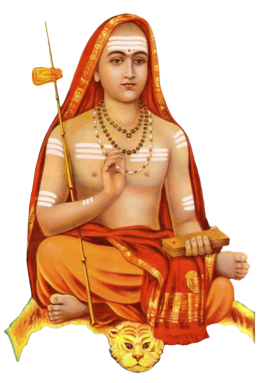नाहं मनुष्यो न च देव-यक्षौ
न ब्राह्मण-क्षत्रिय-वैश्य-शूद्राः ।
न ब्रह्मचारी न गृही वनस्थो
भिक्षुर्न चाहं निजबोध रूपः ॥
nāhaṃ manuṣyo na ca deva-yakṣau
na brāhmaṇa-kṣatriya-vaiśya-śūdrāḥ .
na brahmacārī na gṛhī vanastho
bhikṣurna cāhaṃ nijabodha rūpaḥ ..
English Translation and Notes based on the Bhashya of Sri Sankara
Translated by S. N. Sastri
English Translation and Notes based on the Bhashya of Sri Sankara
Translated by S. N. Sastri
Sri Sankara, at the commencement of his commentary on Hastamalakiyam, says that the desire of every living being on this earth is to enjoy happiness all the time and to be always free from sorrow. The activities of all creatures are directed towards achieving these two objectives. But a rare human being, who has accumulated an abundant store of punya in past lives, realizes that all happiness derived from sense-objects is transitory and is bound to be followed by sorrow. As a result, he develops total detachment towards all sense pleasures and strives to bring an end to Samsara, the continuous cycle of birth and death. Since ignorance of one’s Self (Atma) is the root cause of Samsara and only Self-knowledge can put an end to Samsara, Hastamalaka, referred to here by Sri Sankara as the ‘Acharya’, teaches Self-knowledge in the following twelve verses.
Hastamalakiyam – Introduction – B – Hastamalaka – Intro B – In Sanskrit with English Transliteration, Translation, Meaning and Bhashya – Commentary by Sankaracharya – Hastamalakiyam-Intro-B

